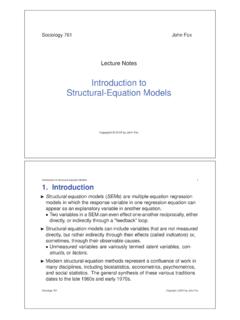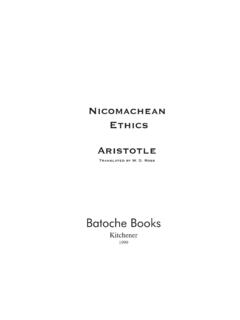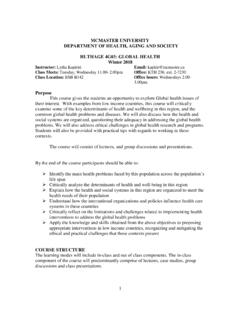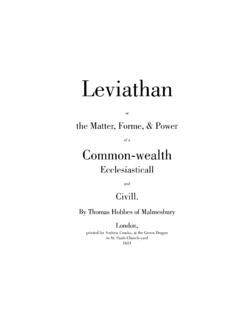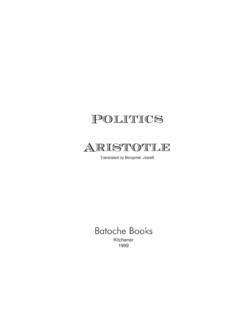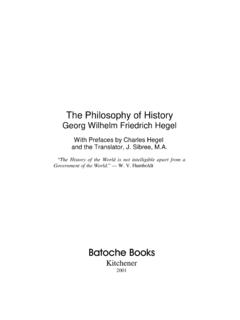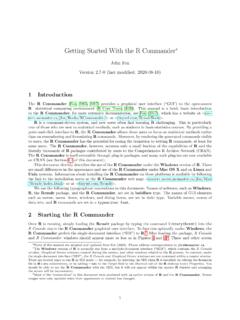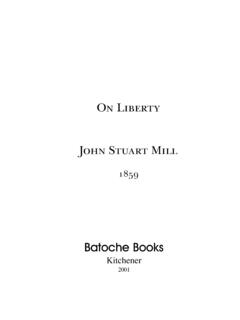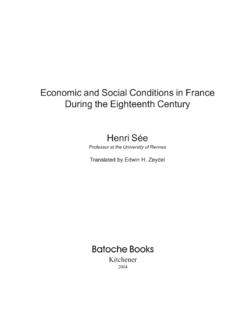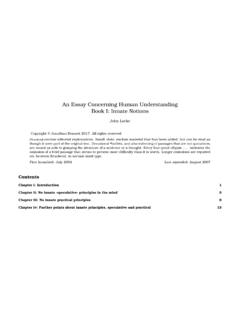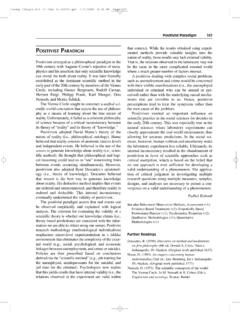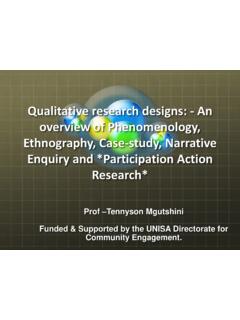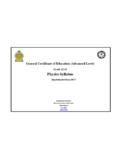Transcription of An Enquiry Concerning Human Understanding David Hume
1 An EnquiryConcerningHuman UnderstandingDavid HumeContentsSect. I. Of the different Species of Philosophy .. 5 Sect. II. Of the Origin of Ideas .. 13 Sect. III. Of the Association of Ideas .. 17 Sect. IV. Sceptical Doubts Concerning the Operations of the Under-standing .. 18 Sect. V. Sceptical Solution of these Doubts .. 29 Sect. VI. Of Probability9 .. 40 Sect. VII. Of the Idea of necessary Connexion .. 42 Sect. VIII. Of Liberty and Necessity .. 55 Sect. IX. Of the Reason of Animals .. 72 Sect. X. Of Miracles.
2 75 Sect. XI. Of a particular Providence and of a future State .. 91 Sect. XII. Of the academical or sceptical Philosophy .. 103 Notes .. 114 Sect. I. Of the different Species of Philosophy1. Moral philosophy, or the science of Human nature, may be treatedafter two different manners; each of which has its peculiar merit, andmay contribute to the entertainment, instruction, and reformation ofmankind. The one considers man chiefly as born for action; and as in-fluenced in his measures by taste and sentiment; pursuing one object,and avoiding another, according to the value which these objects seemto possess, and according to the light in which they present virtue, of all objects, is allowed to be the most valuable, this speciesof philosophers paint her in the most amiable colours.
3 Borrowing allhelps from poetry and eloquence, and treating their subject in an easyand obvious manner, and such as is best fitted to please the imagination,and engage the affections. They select the most striking observationsand instances from common life; place opposite characters in a propercontrast; and alluring us into the paths of virtue by the views of gloryand happiness, direct our steps in these paths by the soundest preceptsand most illustrious examples. They make us feel the difference be-tween vice and virtue; they excite and regulate our sentiments; and sothey can but bend our hearts to the love of probity and true honour, theythink, that they have fully attained the end of all their The other species of philosophers considers man in the light of areasonable rather than an active being, and endeavours to form his un-derstanding more than cultivate his manners.
4 They regard Human natureas a subject of speculation; and with a narrow scrutiny examine it, inorder to find those principles, which regulate our Understanding , exciteour sentiments, and make us approve or blame any particular object,action, or behaviour. They think it a reproach to all literature, that phi-losophy should not yet have fixed, beyond controversy, the foundation6/ David Humeof morals, reasoning, and criticism; and should for ever talk of truth andfalsehood, vice and virtue, beauty and deformity, without being able todetermine the source of these distinctions.
5 While they attempt this ardu-ous task, they are deterred by no difficulties; but proceeding from par-ticular instances to general principles, they still push on their enquiriesto principles more general, and rest not satisfied till they arrive at thoseoriginal principles, by which, in every science, all Human curiosity mustbe bounded. Though their speculations seem abstract, and even unintel-ligible to common readers, they aim at the approbation of the learnedand the wise; and think themselves sufficiently compensated for the labourof their whole lives, if they can discover some hidden truths, which maycontribute to the instruction of It is certain that the easy and obvious philosophy will always,with the generality of mankind, have the preference above the accurateand abstruse.
6 And by many will be recommended, not only as more agree-able, but more useful than the other. It enters more into common life;moulds the heart and affections; and, by touching those principles whichactuate men, reforms their conduct, and brings them nearer to that modelof perfection which it describes. On the contrary, the abstruse philoso-phy, being founded on a turn of mind, which cannot enter into businessand action, vanishes when the philosopher leaves the shade, and comesinto open day; nor can its principles easily retain any influence over ourconduct and behaviour.
7 The feelings of our heart, the agitation of ourpassions, the vehemence of our affections, dissipate all its conclusions,and reduce the profound philosopher to a mere This also must be confessed, that the most durable, as well asjustest fame, has been acquired by the easy philosophy, and that ab-stract reasoners seem hitherto to have enjoyed only a momentary repu-tation, from the caprice or ignorance of their own age, but have not beenable to support their renown with more equitable posterity. It is easy fora profound philosopher to commit a mistake in his subtile reasonings;and one mistake is the necessary parent of another, while he pushes onhis consequences, and is not deterred from embracing any conclusion,by its unusual appearance, or its contradiction to popular opinion.
8 But aphilosopher, who purposes only to represent the common sense of man-kind in more beautiful and more engaging colours, if by accident hefalls into error, goes no farther; but renewing his appeal to commonsense, and the natural sentiments of the mind, returns into the right path,and secures himself from any dangerous illusions. The fame of CiceroEnquiry Concerning Human Understanding /7flourishes at present; but that of Aristotle is utterly decayed. La Bruyerepasses the seas, and still maintains his reputation: But the glory ofMalebranche is confined to his own nation, and to his own age.
9 AndAddison, perhaps, will be read with pleasure, when Locke shall be en-tirely mere philosopher is a character, which is commonly but littleacceptable in the world, as being supposed to contribute nothing eitherto the advantage or pleasure of society; while he lives remote from com-munication with mankind, and is wrapped up in principles and notionsequally remote from their comprehension. On the other hand, the mereignorant is still more despised; nor is anything deemed a surer sign of anilliberal genius in an age and nation where the sciences flourish, than tobe entirely destitute of all relish for those noble entertainments.
10 Themost perfect character is supposed to lie between those extremes; re-taining an equal ability and taste for books, company, and business;preserving in conversation that discernment and delicacy which arisefrom polite letters; and in business, that probity and accuracy which arethe natural result of a just philosophy. In order to diffuse and cultivateso accomplished a character, nothing can be more useful than composi-tions of the easy style and manner, which draw not too much from life,require no deep application or retreat to be comprehended, and sendback the student among mankind full of noble sentiments and wise pre-cepts, applicable to every exigence of Human life.
